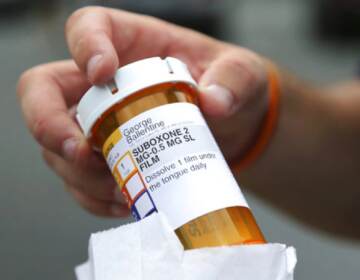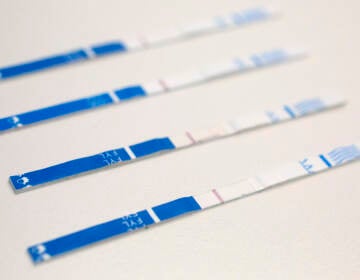Pa. updates plan to fight opioid addiction
The new year is also bringing a new push to pass legislation that would allow Department of Health to declare a "public health emergency."

Dr. Rachel Levine, Pennsylvania's secretary of health, speaks to reporters. (Brett Sholtis/Transforming Health)
Pennsylvania officials renewed their plans to respond to the opioid crisis that claimed 5,456 lives in the commonwealth in 2017. While some plans discussed at a Monday press conference are continuations of ongoing programs, officials did mention a few new or recent efforts.
At the state’s bureau of mental health and substance abuse services, deputy secretary Lynn Kovich said a new drug and alcohol referral tool — also known as DART — helps get the right resources to people struggling with addiction and family members of people with addiction.
“It can be very daunting for a family to find treatment, so the DART is a centralized way to help people access treatment,” Kovich said.
Bureau of Community Corrections director Danny McIntyre said the state’s plan to put in at least one body scanner at each of Pennsylvania’s 25 correctional facilities will help keep people from overdosing. The body scanners are a response to the wave of drug overdoses and drug exposures at prisons last year that in some instances also sickened corrections workers.
“So we did a pilot program at SCI Cole, using body scanners,” McIntyre said. “It’s reduced the amount of contraband. It’s had a huge impact on the population there. It’s had a positive impact.”
The corrections department is spending $5.7 million to acquire the two dozen body scanners, as well as some hand-held scanning devices, said Gov. Tom Wolf administration spokeswoman Sara Goulet.
The new year also brings a push to pass legislation that would allow the Department of Health to declare a “public health emergency.”
That designation shouldn’t be confused with the “disaster emergency” status for the opioid crisis Wolf renewed Dec. 21, and which has been in effect for almost a year.
Rather, the public health emergency declaration would be “narrowly tailored” to problems related to public health, said Pennsylvania Dem. State Sen. Jay Costa, who sponsored the bill last year. Such a designation would allow the Department of Health to waive regulations and create new, temporary ones in the event of an emergency, Costa said.
Those emergencies could range from a disease outbreak to a nuclear or biological attack, according to the bill’s memo.
Last year the bill passed the state senate 49-0 but failed in the state house after meeting opposition from lawmakers — led by then-State Senator Scott Wagner — who were concerned that the public emergency declaration could limit 2nd Amendment rights.
This year there will be a renewed effort to pass the legislation, said Department of Health Secretary Dr. Rachel Levine.
“The opioid epidemic is a public health crisis, and the ability to declare a public health emergency ensures that we can mobilize our public health resources for this crisis, and for future crises,” she said.
WHYY is your source for fact-based, in-depth journalism and information. As a nonprofit organization, we rely on financial support from readers like you. Please give today.





